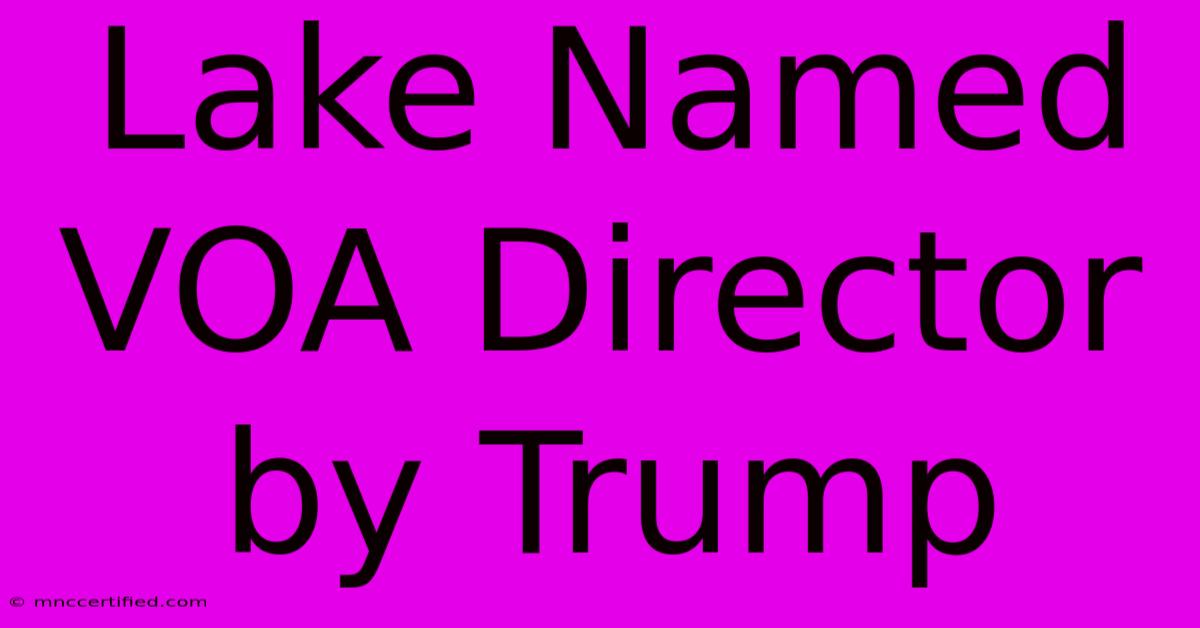Lake Named VOA Director By Trump

Table of Contents
Lake Named VOA Director by Trump: Controversy and Consequences
On June 27, 2018, President Donald Trump appointed Michael Pack as the director of the U.S. Agency for Global Media (USAGM), which oversees the Voice of America (VOA). This appointment, particularly given Pack's background and subsequent actions, ignited significant controversy and raised serious concerns about the future of journalistic integrity at VOA. This article delves into the appointment, the ensuing backlash, and the long-term implications for the agency's reputation and global reach.
Michael Pack: A Controversial Choice
Michael Pack, a conservative filmmaker and staunch Trump supporter, was a far cry from the traditionally apolitical figures who had previously led the VOA. His appointment immediately sparked alarm among journalists and free speech advocates. Concerns centered around Pack's outspoken criticism of the VOA, labeling it as biased against the Trump administration and vowing to reshape its editorial direction. This raised the specter of political interference, jeopardizing VOA's crucial role as a source of unbiased news for international audiences.
Pack's Pre-Appointment Statements and Criticisms
Before his appointment, Pack openly voiced his belief that VOA had a liberal bias, aligning with the narrative often pushed by the Trump administration to discredit mainstream media. He publicly called for significant changes within the organization, suggesting a potential purge of journalists deemed insufficiently loyal to the administration's agenda. These statements, seen by many as a blatant threat to journalistic independence, fueled concerns about potential censorship and the erosion of VOA's credibility.
The Backlash and Legal Challenges
Pack's appointment faced immediate and widespread opposition. Journalists, media organizations, and civil liberties groups expressed deep concerns about the potential for political manipulation and the undermining of VOA's core mission. Numerous lawsuits were filed, challenging the legality of Pack's appointment and his subsequent actions, many alleging violations of the agency's charter which emphasizes editorial independence. These legal battles highlighted the high stakes involved in the fight to protect VOA's journalistic integrity.
Key Legal Arguments and Outcomes
The legal challenges focused on Pack's alleged violations of the USAGM's mandate to maintain editorial independence. Arguments centered on Pack's interference in editorial decisions, the removal of senior journalists, and the promotion of individuals perceived as politically aligned with the Trump administration. While the full legal outcomes are complex and evolved over time, the lawsuits served as a crucial check on Pack's actions and emphasized the importance of judicial oversight in protecting the agency's independence.
Long-Term Impacts on VOA's Credibility
The consequences of Pack's appointment extended far beyond the immediate legal battles. His actions, whether successful or ultimately overruled, damaged VOA's reputation for impartiality. The perception of political bias, even if ultimately unfounded, can severely harm the agency’s ability to reach and influence its global audience. Trust, a cornerstone of credible journalism, took a significant blow.
Damage to International Relations
The politicization of VOA under Pack's leadership could have negatively impacted U.S. relationships with other countries. International audiences rely on VOA for unbiased information. A perceived shift towards partisan reporting could decrease the agency's influence and credibility, thereby undermining U.S. soft power efforts.
Conclusion: The Fight for VOA's Independence
The appointment of Michael Pack as VOA director under the Trump administration stands as a stark reminder of the ongoing struggle to protect journalistic integrity and the vital role of independent media in a globalized world. The controversy surrounding his tenure highlights the importance of maintaining the editorial independence of crucial news organizations like VOA, not only for the sake of journalistic standards, but also for the preservation of democratic values and international relations. The legal battles and public outcry demonstrated a robust defense of the principles of unbiased reporting and free speech, emphasizing the continuing need for vigilance in safeguarding these core tenets. The impact of this period on VOA's long-term credibility and global reach continues to be a subject of analysis and debate.

Thank you for visiting our website wich cover about Lake Named VOA Director By Trump. We hope the information provided has been useful to you. Feel free to contact us if you have any questions or need further assistance. See you next time and dont miss to bookmark.
Featured Posts
-
Broadcom Beats Earnings Stock Up
Dec 13, 2024
-
No Good Deed A Holiday Comedy Mystery
Dec 13, 2024
-
Guadalupe Unites Divided Bishops
Dec 13, 2024
-
49ers News Purdy Key Players Face Rams
Dec 13, 2024
-
Accused Capitol Harasser Pleads Not Guilty
Dec 13, 2024